Cultural Self-Awareness and Intelligence: A Critical Reflection
VerifiedAdded on 2023/01/05
|7
|1561
|33
Report
AI Summary
This report critically examines the relationship between cultural self-awareness and cultural intelligence, crucial for effective leadership in a globalized world. The report defines both terms and explores how self-awareness, the understanding of one's own cultural background and biases, significantly enhances one's ability to navigate and succeed in diverse cultural contexts. Drawing on readings from the course, the report analyzes concepts like cultural shock, the impact of culture on behavior, and the importance of adaptability and empathy in cross-cultural interactions. The author reflects on personal experiences to illustrate these points, demonstrating how increased self-awareness has facilitated improved understanding and interaction with diverse cultural groups. The report concludes that cultural self-awareness forms the foundation for developing cultural intelligence, enabling individuals to adapt to new environments and lead diverse teams effectively. The report emphasizes the need for flexibility, understanding, and the ability to manage cultural differences in order to succeed in international business settings. The references include works by Spencer-Oatey, Brislin, and others.
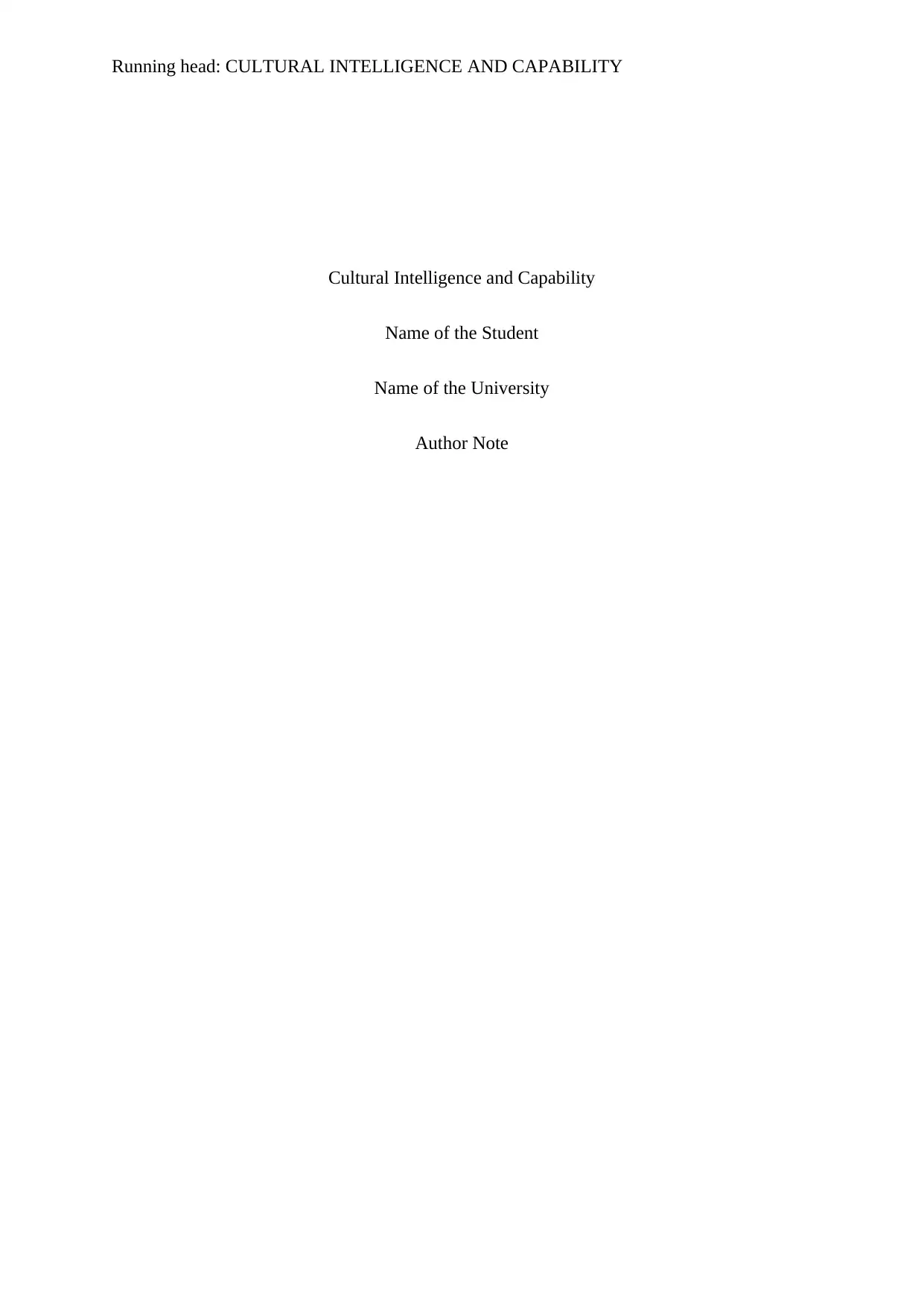
Running head: CULTURAL INTELLIGENCE AND CAPABILITY
Cultural Intelligence and Capability
Name of the Student
Name of the University
Author Note
Cultural Intelligence and Capability
Name of the Student
Name of the University
Author Note
Paraphrase This Document
Need a fresh take? Get an instant paraphrase of this document with our AI Paraphraser
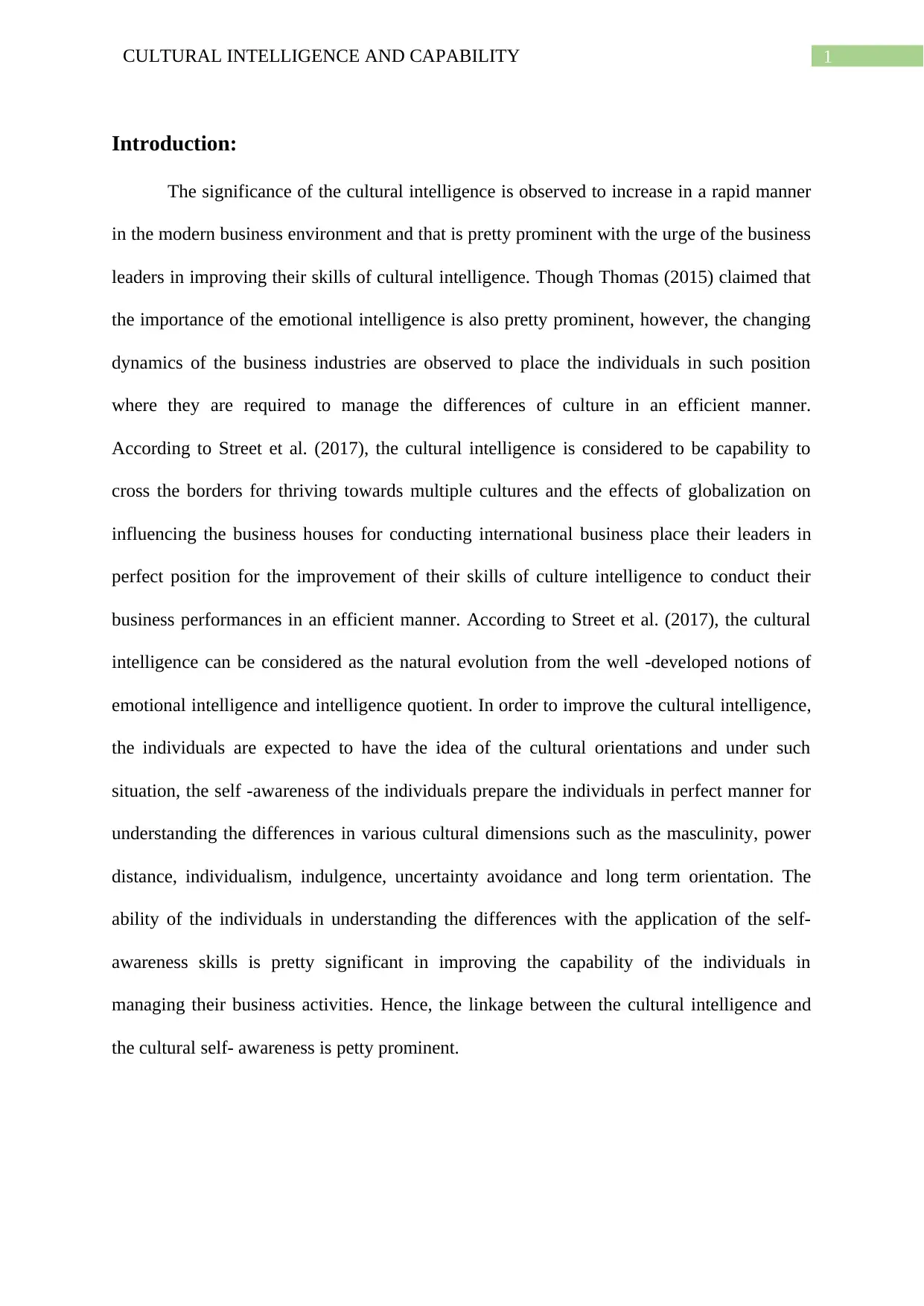
1CULTURAL INTELLIGENCE AND CAPABILITY
Introduction:
The significance of the cultural intelligence is observed to increase in a rapid manner
in the modern business environment and that is pretty prominent with the urge of the business
leaders in improving their skills of cultural intelligence. Though Thomas (2015) claimed that
the importance of the emotional intelligence is also pretty prominent, however, the changing
dynamics of the business industries are observed to place the individuals in such position
where they are required to manage the differences of culture in an efficient manner.
According to Street et al. (2017), the cultural intelligence is considered to be capability to
cross the borders for thriving towards multiple cultures and the effects of globalization on
influencing the business houses for conducting international business place their leaders in
perfect position for the improvement of their skills of culture intelligence to conduct their
business performances in an efficient manner. According to Street et al. (2017), the cultural
intelligence can be considered as the natural evolution from the well -developed notions of
emotional intelligence and intelligence quotient. In order to improve the cultural intelligence,
the individuals are expected to have the idea of the cultural orientations and under such
situation, the self -awareness of the individuals prepare the individuals in perfect manner for
understanding the differences in various cultural dimensions such as the masculinity, power
distance, individualism, indulgence, uncertainty avoidance and long term orientation. The
ability of the individuals in understanding the differences with the application of the self-
awareness skills is pretty significant in improving the capability of the individuals in
managing their business activities. Hence, the linkage between the cultural intelligence and
the cultural self- awareness is petty prominent.
Introduction:
The significance of the cultural intelligence is observed to increase in a rapid manner
in the modern business environment and that is pretty prominent with the urge of the business
leaders in improving their skills of cultural intelligence. Though Thomas (2015) claimed that
the importance of the emotional intelligence is also pretty prominent, however, the changing
dynamics of the business industries are observed to place the individuals in such position
where they are required to manage the differences of culture in an efficient manner.
According to Street et al. (2017), the cultural intelligence is considered to be capability to
cross the borders for thriving towards multiple cultures and the effects of globalization on
influencing the business houses for conducting international business place their leaders in
perfect position for the improvement of their skills of culture intelligence to conduct their
business performances in an efficient manner. According to Street et al. (2017), the cultural
intelligence can be considered as the natural evolution from the well -developed notions of
emotional intelligence and intelligence quotient. In order to improve the cultural intelligence,
the individuals are expected to have the idea of the cultural orientations and under such
situation, the self -awareness of the individuals prepare the individuals in perfect manner for
understanding the differences in various cultural dimensions such as the masculinity, power
distance, individualism, indulgence, uncertainty avoidance and long term orientation. The
ability of the individuals in understanding the differences with the application of the self-
awareness skills is pretty significant in improving the capability of the individuals in
managing their business activities. Hence, the linkage between the cultural intelligence and
the cultural self- awareness is petty prominent.
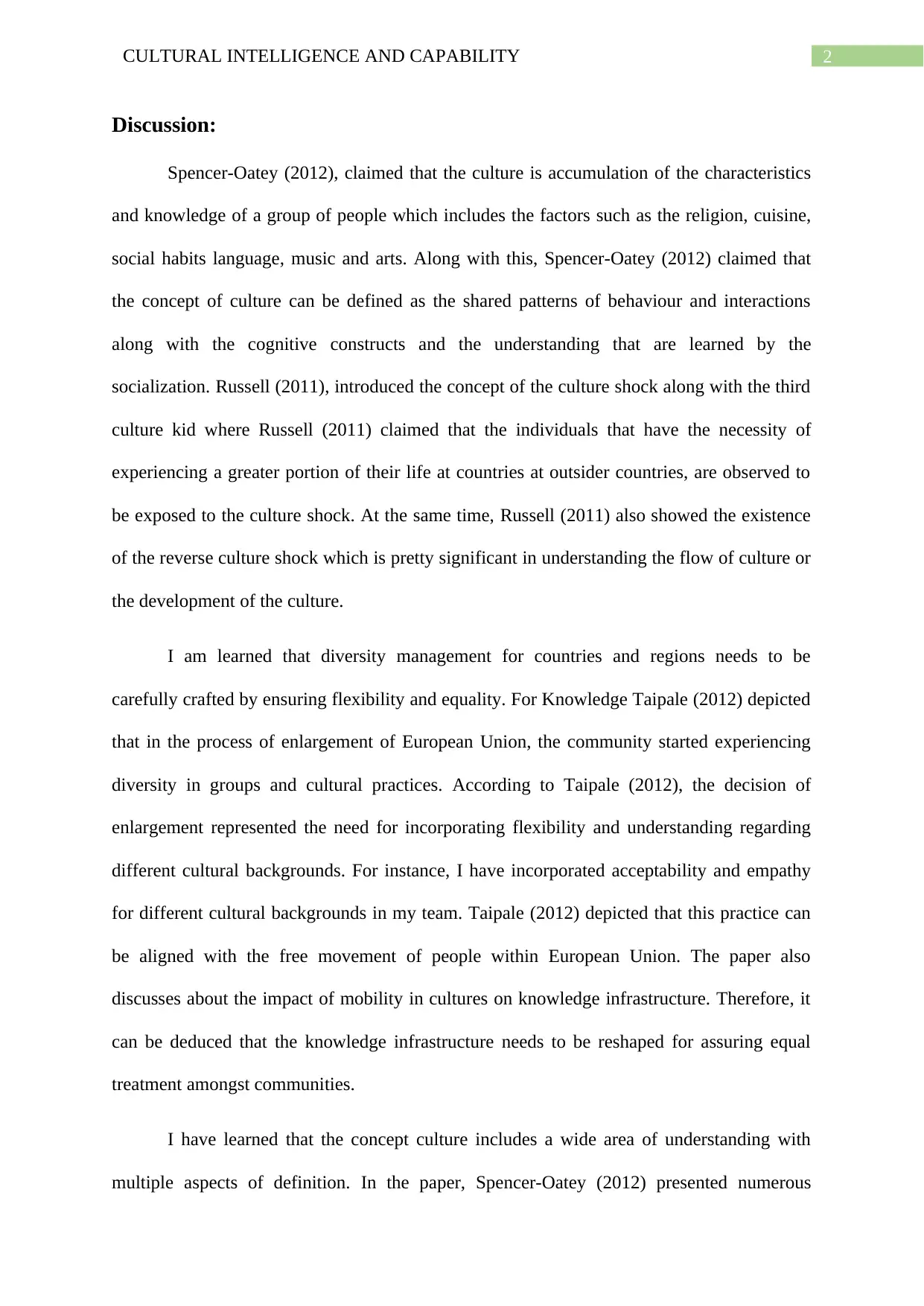
2CULTURAL INTELLIGENCE AND CAPABILITY
Discussion:
Spencer-Oatey (2012), claimed that the culture is accumulation of the characteristics
and knowledge of a group of people which includes the factors such as the religion, cuisine,
social habits language, music and arts. Along with this, Spencer-Oatey (2012) claimed that
the concept of culture can be defined as the shared patterns of behaviour and interactions
along with the cognitive constructs and the understanding that are learned by the
socialization. Russell (2011), introduced the concept of the culture shock along with the third
culture kid where Russell (2011) claimed that the individuals that have the necessity of
experiencing a greater portion of their life at countries at outsider countries, are observed to
be exposed to the culture shock. At the same time, Russell (2011) also showed the existence
of the reverse culture shock which is pretty significant in understanding the flow of culture or
the development of the culture.
I am learned that diversity management for countries and regions needs to be
carefully crafted by ensuring flexibility and equality. For Knowledge Taipale (2012) depicted
that in the process of enlargement of European Union, the community started experiencing
diversity in groups and cultural practices. According to Taipale (2012), the decision of
enlargement represented the need for incorporating flexibility and understanding regarding
different cultural backgrounds. For instance, I have incorporated acceptability and empathy
for different cultural backgrounds in my team. Taipale (2012) depicted that this practice can
be aligned with the free movement of people within European Union. The paper also
discusses about the impact of mobility in cultures on knowledge infrastructure. Therefore, it
can be deduced that the knowledge infrastructure needs to be reshaped for assuring equal
treatment amongst communities.
I have learned that the concept culture includes a wide area of understanding with
multiple aspects of definition. In the paper, Spencer-Oatey (2012) presented numerous
Discussion:
Spencer-Oatey (2012), claimed that the culture is accumulation of the characteristics
and knowledge of a group of people which includes the factors such as the religion, cuisine,
social habits language, music and arts. Along with this, Spencer-Oatey (2012) claimed that
the concept of culture can be defined as the shared patterns of behaviour and interactions
along with the cognitive constructs and the understanding that are learned by the
socialization. Russell (2011), introduced the concept of the culture shock along with the third
culture kid where Russell (2011) claimed that the individuals that have the necessity of
experiencing a greater portion of their life at countries at outsider countries, are observed to
be exposed to the culture shock. At the same time, Russell (2011) also showed the existence
of the reverse culture shock which is pretty significant in understanding the flow of culture or
the development of the culture.
I am learned that diversity management for countries and regions needs to be
carefully crafted by ensuring flexibility and equality. For Knowledge Taipale (2012) depicted
that in the process of enlargement of European Union, the community started experiencing
diversity in groups and cultural practices. According to Taipale (2012), the decision of
enlargement represented the need for incorporating flexibility and understanding regarding
different cultural backgrounds. For instance, I have incorporated acceptability and empathy
for different cultural backgrounds in my team. Taipale (2012) depicted that this practice can
be aligned with the free movement of people within European Union. The paper also
discusses about the impact of mobility in cultures on knowledge infrastructure. Therefore, it
can be deduced that the knowledge infrastructure needs to be reshaped for assuring equal
treatment amongst communities.
I have learned that the concept culture includes a wide area of understanding with
multiple aspects of definition. In the paper, Spencer-Oatey (2012) presented numerous
⊘ This is a preview!⊘
Do you want full access?
Subscribe today to unlock all pages.

Trusted by 1+ million students worldwide
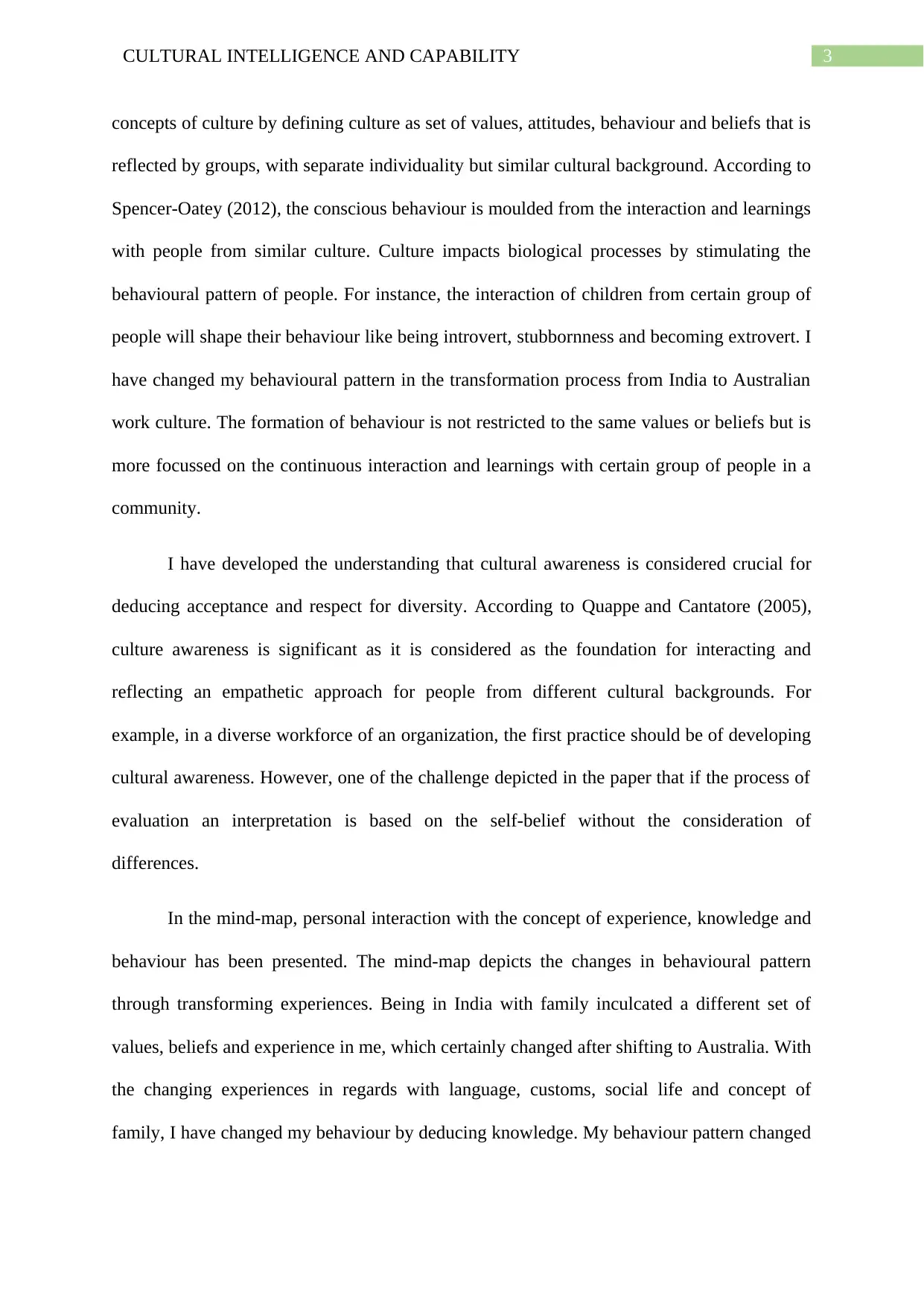
3CULTURAL INTELLIGENCE AND CAPABILITY
concepts of culture by defining culture as set of values, attitudes, behaviour and beliefs that is
reflected by groups, with separate individuality but similar cultural background. According to
Spencer-Oatey (2012), the conscious behaviour is moulded from the interaction and learnings
with people from similar culture. Culture impacts biological processes by stimulating the
behavioural pattern of people. For instance, the interaction of children from certain group of
people will shape their behaviour like being introvert, stubbornness and becoming extrovert. I
have changed my behavioural pattern in the transformation process from India to Australian
work culture. The formation of behaviour is not restricted to the same values or beliefs but is
more focussed on the continuous interaction and learnings with certain group of people in a
community.
I have developed the understanding that cultural awareness is considered crucial for
deducing acceptance and respect for diversity. According to Quappe and Cantatore (2005),
culture awareness is significant as it is considered as the foundation for interacting and
reflecting an empathetic approach for people from different cultural backgrounds. For
example, in a diverse workforce of an organization, the first practice should be of developing
cultural awareness. However, one of the challenge depicted in the paper that if the process of
evaluation an interpretation is based on the self-belief without the consideration of
differences.
In the mind-map, personal interaction with the concept of experience, knowledge and
behaviour has been presented. The mind-map depicts the changes in behavioural pattern
through transforming experiences. Being in India with family inculcated a different set of
values, beliefs and experience in me, which certainly changed after shifting to Australia. With
the changing experiences in regards with language, customs, social life and concept of
family, I have changed my behaviour by deducing knowledge. My behaviour pattern changed
concepts of culture by defining culture as set of values, attitudes, behaviour and beliefs that is
reflected by groups, with separate individuality but similar cultural background. According to
Spencer-Oatey (2012), the conscious behaviour is moulded from the interaction and learnings
with people from similar culture. Culture impacts biological processes by stimulating the
behavioural pattern of people. For instance, the interaction of children from certain group of
people will shape their behaviour like being introvert, stubbornness and becoming extrovert. I
have changed my behavioural pattern in the transformation process from India to Australian
work culture. The formation of behaviour is not restricted to the same values or beliefs but is
more focussed on the continuous interaction and learnings with certain group of people in a
community.
I have developed the understanding that cultural awareness is considered crucial for
deducing acceptance and respect for diversity. According to Quappe and Cantatore (2005),
culture awareness is significant as it is considered as the foundation for interacting and
reflecting an empathetic approach for people from different cultural backgrounds. For
example, in a diverse workforce of an organization, the first practice should be of developing
cultural awareness. However, one of the challenge depicted in the paper that if the process of
evaluation an interpretation is based on the self-belief without the consideration of
differences.
In the mind-map, personal interaction with the concept of experience, knowledge and
behaviour has been presented. The mind-map depicts the changes in behavioural pattern
through transforming experiences. Being in India with family inculcated a different set of
values, beliefs and experience in me, which certainly changed after shifting to Australia. With
the changing experiences in regards with language, customs, social life and concept of
family, I have changed my behaviour by deducing knowledge. My behaviour pattern changed
Paraphrase This Document
Need a fresh take? Get an instant paraphrase of this document with our AI Paraphraser
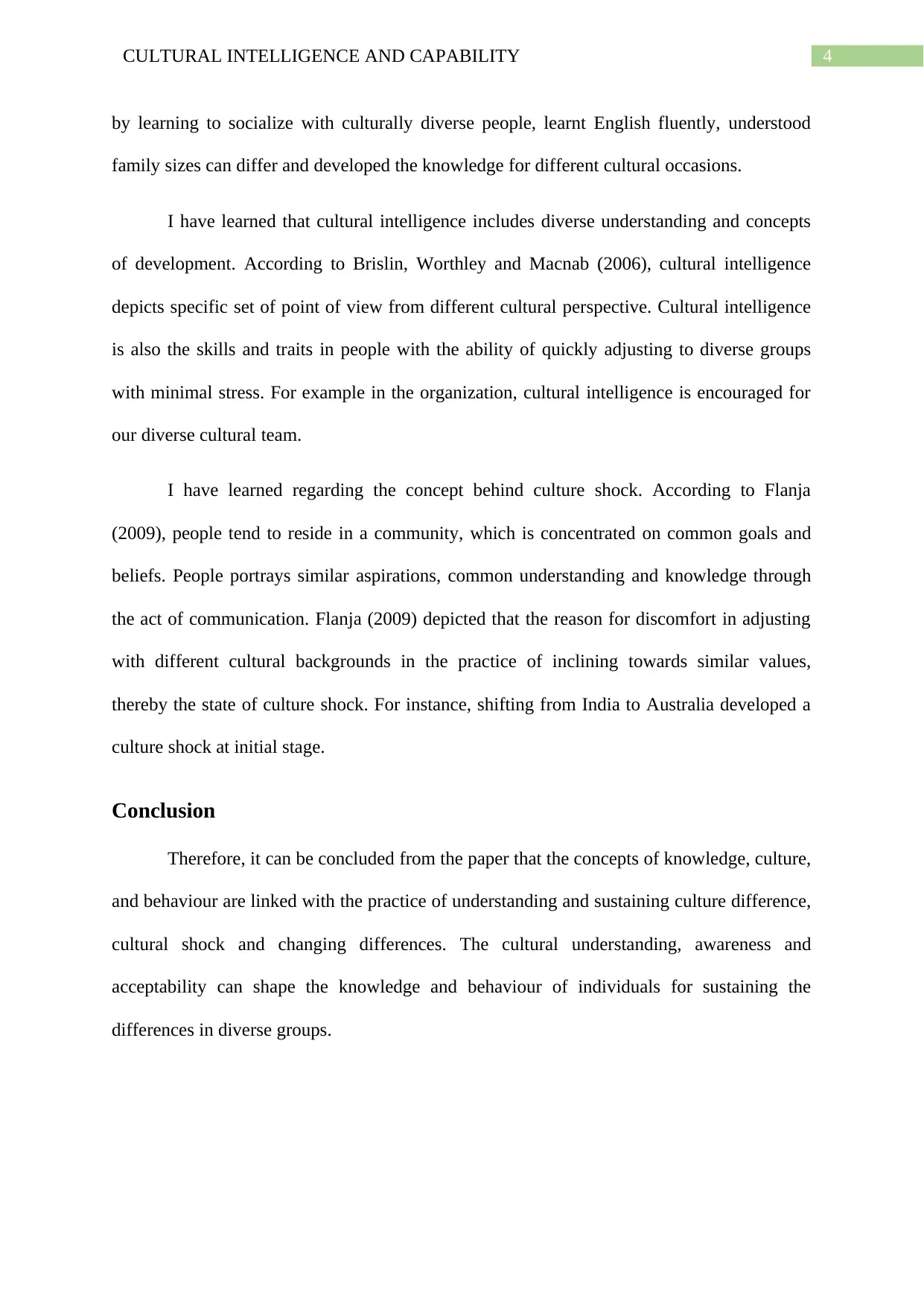
4CULTURAL INTELLIGENCE AND CAPABILITY
by learning to socialize with culturally diverse people, learnt English fluently, understood
family sizes can differ and developed the knowledge for different cultural occasions.
I have learned that cultural intelligence includes diverse understanding and concepts
of development. According to Brislin, Worthley and Macnab (2006), cultural intelligence
depicts specific set of point of view from different cultural perspective. Cultural intelligence
is also the skills and traits in people with the ability of quickly adjusting to diverse groups
with minimal stress. For example in the organization, cultural intelligence is encouraged for
our diverse cultural team.
I have learned regarding the concept behind culture shock. According to Flanja
(2009), people tend to reside in a community, which is concentrated on common goals and
beliefs. People portrays similar aspirations, common understanding and knowledge through
the act of communication. Flanja (2009) depicted that the reason for discomfort in adjusting
with different cultural backgrounds in the practice of inclining towards similar values,
thereby the state of culture shock. For instance, shifting from India to Australia developed a
culture shock at initial stage.
Conclusion
Therefore, it can be concluded from the paper that the concepts of knowledge, culture,
and behaviour are linked with the practice of understanding and sustaining culture difference,
cultural shock and changing differences. The cultural understanding, awareness and
acceptability can shape the knowledge and behaviour of individuals for sustaining the
differences in diverse groups.
by learning to socialize with culturally diverse people, learnt English fluently, understood
family sizes can differ and developed the knowledge for different cultural occasions.
I have learned that cultural intelligence includes diverse understanding and concepts
of development. According to Brislin, Worthley and Macnab (2006), cultural intelligence
depicts specific set of point of view from different cultural perspective. Cultural intelligence
is also the skills and traits in people with the ability of quickly adjusting to diverse groups
with minimal stress. For example in the organization, cultural intelligence is encouraged for
our diverse cultural team.
I have learned regarding the concept behind culture shock. According to Flanja
(2009), people tend to reside in a community, which is concentrated on common goals and
beliefs. People portrays similar aspirations, common understanding and knowledge through
the act of communication. Flanja (2009) depicted that the reason for discomfort in adjusting
with different cultural backgrounds in the practice of inclining towards similar values,
thereby the state of culture shock. For instance, shifting from India to Australia developed a
culture shock at initial stage.
Conclusion
Therefore, it can be concluded from the paper that the concepts of knowledge, culture,
and behaviour are linked with the practice of understanding and sustaining culture difference,
cultural shock and changing differences. The cultural understanding, awareness and
acceptability can shape the knowledge and behaviour of individuals for sustaining the
differences in diverse groups.
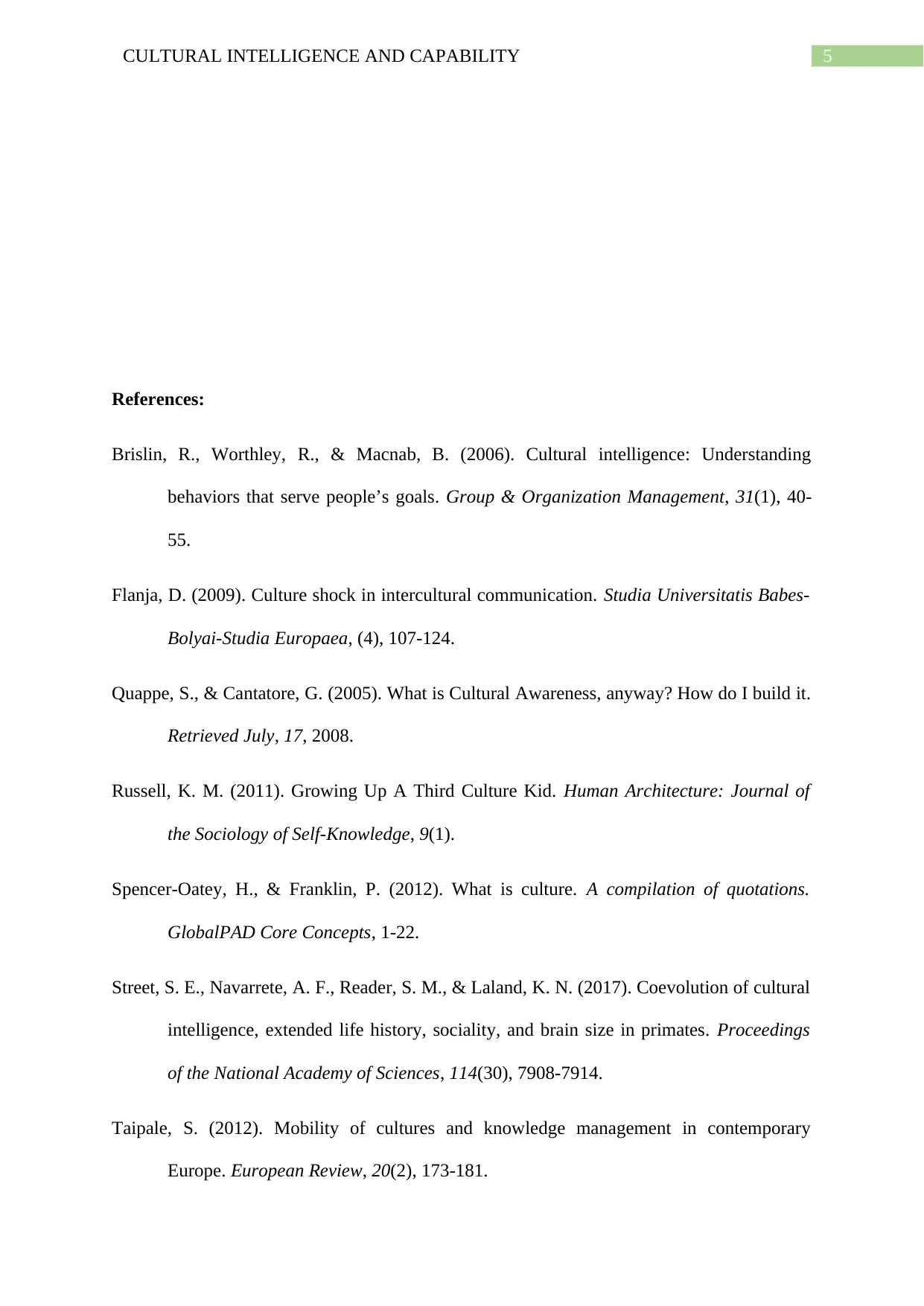
5CULTURAL INTELLIGENCE AND CAPABILITY
References:
Brislin, R., Worthley, R., & Macnab, B. (2006). Cultural intelligence: Understanding
behaviors that serve people’s goals. Group & Organization Management, 31(1), 40-
55.
Flanja, D. (2009). Culture shock in intercultural communication. Studia Universitatis Babes-
Bolyai-Studia Europaea, (4), 107-124.
Quappe, S., & Cantatore, G. (2005). What is Cultural Awareness, anyway? How do I build it.
Retrieved July, 17, 2008.
Russell, K. M. (2011). Growing Up A Third Culture Kid. Human Architecture: Journal of
the Sociology of Self-Knowledge, 9(1).
Spencer-Oatey, H., & Franklin, P. (2012). What is culture. A compilation of quotations.
GlobalPAD Core Concepts, 1-22.
Street, S. E., Navarrete, A. F., Reader, S. M., & Laland, K. N. (2017). Coevolution of cultural
intelligence, extended life history, sociality, and brain size in primates. Proceedings
of the National Academy of Sciences, 114(30), 7908-7914.
Taipale, S. (2012). Mobility of cultures and knowledge management in contemporary
Europe. European Review, 20(2), 173-181.
References:
Brislin, R., Worthley, R., & Macnab, B. (2006). Cultural intelligence: Understanding
behaviors that serve people’s goals. Group & Organization Management, 31(1), 40-
55.
Flanja, D. (2009). Culture shock in intercultural communication. Studia Universitatis Babes-
Bolyai-Studia Europaea, (4), 107-124.
Quappe, S., & Cantatore, G. (2005). What is Cultural Awareness, anyway? How do I build it.
Retrieved July, 17, 2008.
Russell, K. M. (2011). Growing Up A Third Culture Kid. Human Architecture: Journal of
the Sociology of Self-Knowledge, 9(1).
Spencer-Oatey, H., & Franklin, P. (2012). What is culture. A compilation of quotations.
GlobalPAD Core Concepts, 1-22.
Street, S. E., Navarrete, A. F., Reader, S. M., & Laland, K. N. (2017). Coevolution of cultural
intelligence, extended life history, sociality, and brain size in primates. Proceedings
of the National Academy of Sciences, 114(30), 7908-7914.
Taipale, S. (2012). Mobility of cultures and knowledge management in contemporary
Europe. European Review, 20(2), 173-181.
⊘ This is a preview!⊘
Do you want full access?
Subscribe today to unlock all pages.

Trusted by 1+ million students worldwide
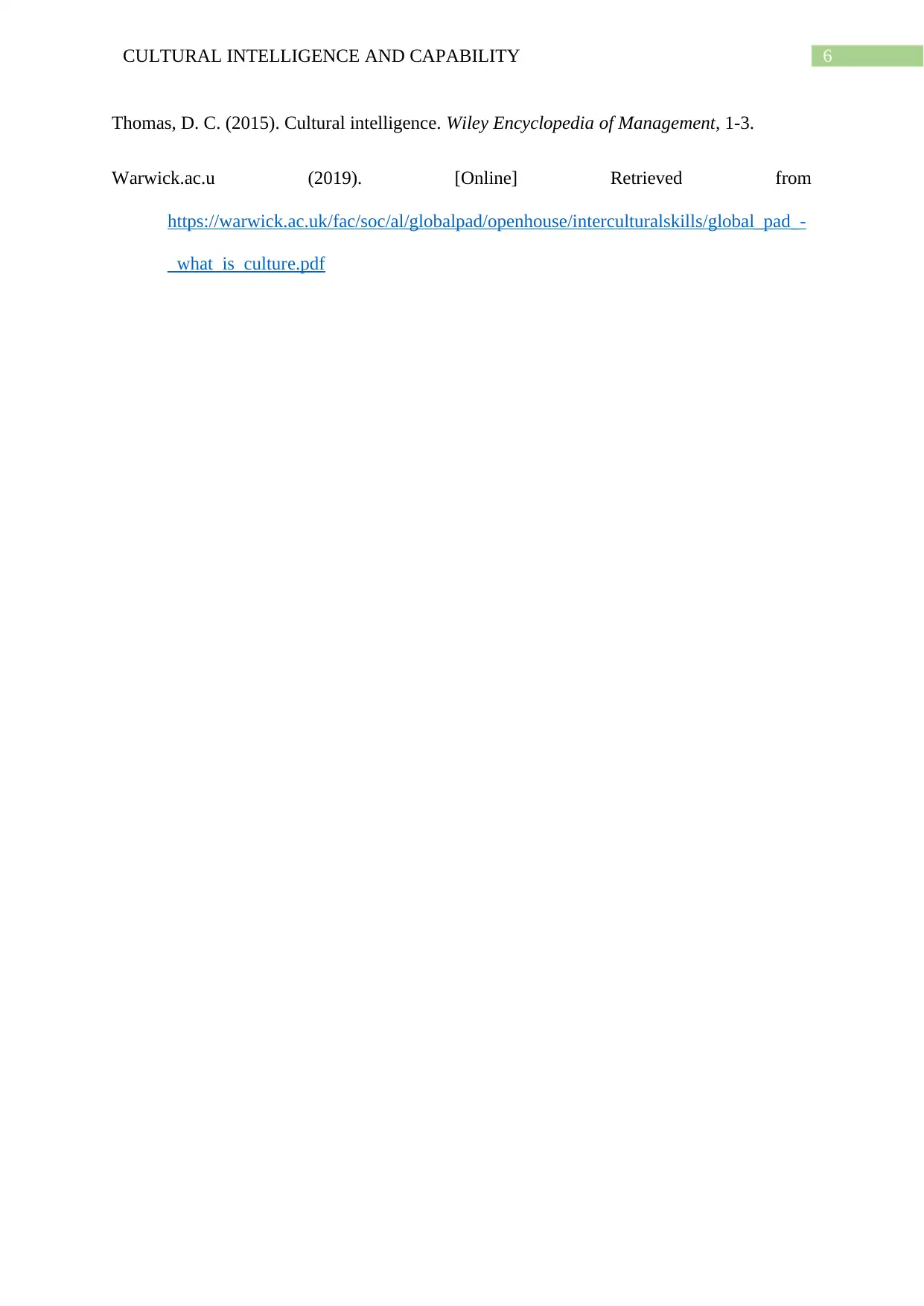
6CULTURAL INTELLIGENCE AND CAPABILITY
Thomas, D. C. (2015). Cultural intelligence. Wiley Encyclopedia of Management, 1-3.
Warwick.ac.u (2019). [Online] Retrieved from
https://warwick.ac.uk/fac/soc/al/globalpad/openhouse/interculturalskills/global_pad_-
_what_is_culture.pdf
Thomas, D. C. (2015). Cultural intelligence. Wiley Encyclopedia of Management, 1-3.
Warwick.ac.u (2019). [Online] Retrieved from
https://warwick.ac.uk/fac/soc/al/globalpad/openhouse/interculturalskills/global_pad_-
_what_is_culture.pdf
1 out of 7
Your All-in-One AI-Powered Toolkit for Academic Success.
+13062052269
info@desklib.com
Available 24*7 on WhatsApp / Email
![[object Object]](/_next/static/media/star-bottom.7253800d.svg)
Unlock your academic potential
Copyright © 2020–2026 A2Z Services. All Rights Reserved. Developed and managed by ZUCOL.


